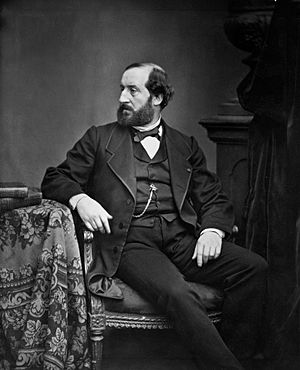Émile Augier facts for kids
Quick facts for kids
Émile Augier
|
|
|---|---|

Augier by Antoine Samuel Adam-Salomon, c. 1870s
|
|
| Born | 17 September 1820 Valence, Drôme, France |
| Died | 25 October 1889 (aged 69) Croissy-sur-Seine, France |
| Occupation | playwright |
| Notable works | L'Aventurière Les Fourchambault |
| Notable awards | Académie française |
| Signature | |
 |
|
Guillaume Victor Émile Augier (born September 17, 1820 – died October 25, 1889) was a famous French playwright. A playwright writes plays for the theater. He was chosen to be a member of the Académie française on March 31, 1857. This is a very important group in France that protects the French language and arts. He was the thirteenth person to hold his specific seat in the Academy.
Émile Augier's Life Story
Émile Augier was born in Valence, Drôme, France. His grandfather was a well-known writer named Pigault Lebrun. Émile came from a comfortable middle-class family. He received a good education and studied law.
In 1844, he wrote a play called La Ciguë. It was a two-act play written in verse. At first, a famous theater called the Théâtre Français did not want to perform it. However, another theater, the Odéon, put it on stage. The play was a big success! This success helped Augier decide that writing plays was what he wanted to do.
From then on, he wrote many plays. He sometimes worked alone and sometimes with other writers. Some of his collaborators included Jules Sandeau, Eugène Marin Labiche, and Édouard Foussier. One of his plays, Le Fils de Giboyer (1862), caused some discussion. His last play, Les Fourchambault, was written in 1879. After that, he stopped writing. He wanted to make sure all his works were of high quality.
Émile Augier passed away at his home in Croissy-sur-Seine.
Augier's Playwriting Career
Émile Augier once said his own life was "without incident." But his plays were full of interesting stories and ideas. His first important play was L'Aventurière (1848). This play showed a new direction away from the popular romantic plays of the time.
In his play Gabrielle (1849), the husband is shown as the good and understanding character. This was different from many plays where the lover was often the hero. Augier also wrote the story (called a libretto) for the first opera by Charles Gounod. This opera was named Sapho (1851).
Augier's plays often explored important social topics. He wrote about things like the desire for money and power. He also discussed social problems and political ideas. Some of his famous plays that did this include:
- Les Effrontés (1861)
- Le Fils de Giboyer (1862)
- La Contagion (1866), which was also known as Le Baron d'Estrigaud
- Lions et renards (1869)
These plays, along with Le Gendre de Monsieur Poirier (1854), are considered some of his best works. Le Gendre de Monsieur Poirier was written with Jules Sandeau. In Philiberte (1853), Augier created a charming and lighthearted comedy. After the difficult events of 1870 in France, he wrote Jean de Thommeray (1873). This play had a strong message of patriotism and hope for the country.
His last two dramas were Madame Caverlet (1876) and Les Fourchambault (1879). These are sometimes called "problem plays" because they explored social issues. Augier was not just a storyteller; he was also a moralist. This means he used his plays to teach lessons about right and wrong, much like the famous playwright Molière.
The strength of Augier's plays came from their characters. His characters felt real, and many of them represented common types of people. His first play, La Ciguë, came out when romantic dramas were becoming less popular. While his plays might not have had grand poetic language, his verse was excellent for drama. The prose in his plays was clear, lively, and often very witty.
See also
 In Spanish: Émile Augier para niños
In Spanish: Émile Augier para niños
- Nostalgie de la boue, a phrase from his 1855 play Mariage d'Olympe
 | James Van Der Zee |
 | Alma Thomas |
 | Ellis Wilson |
 | Margaret Taylor-Burroughs |

